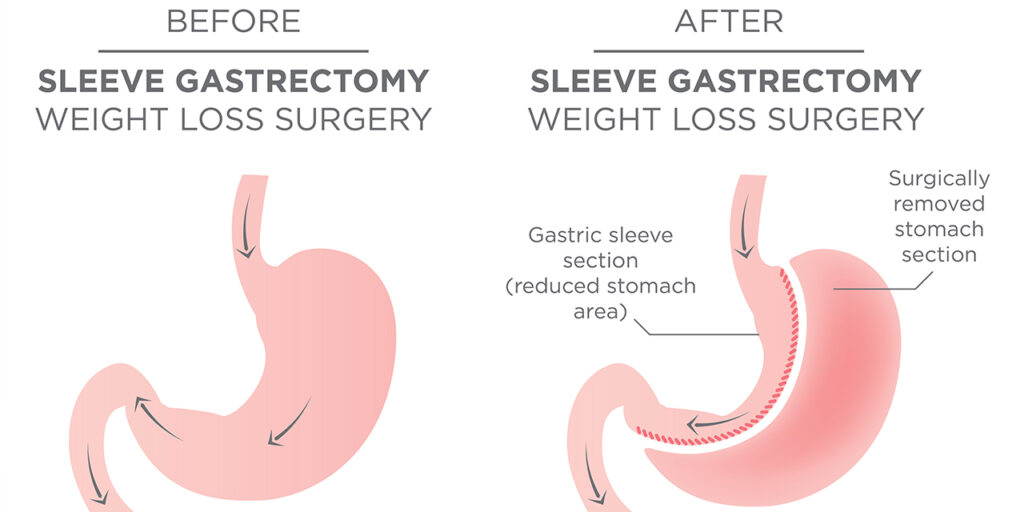
Are you dealing with severe obesity and can’t lose weight after trying all-natural remedies? Are you that person who keeps dieting and following a strict exercise regimen but still can’t lose that extra fat? Perhaps it’s time to look at surgical possibilities like bariatric or weight-loss surgery.
Bariatric surgery helps reduce the risk of many life-threatening weight-related disorders such as non-alcoholic fatty liver disease, high blood pressure, type 2 diabetes mellitus, and cardiovascular disease.
Bariatric surgery offers many benefits, but you must accept that it is a major surgery and can pose many risks. Therefore, it is necessary to select the best hospital with skilled surgeons to get the results you have always wanted Bariatric surgery hospitals in India, Turkey, Thailand, Germany, and UAE have the latest medical technology and best-in-class facilities.
What is bariatric surgery?
It can be frustrating if you’ve tried every natural way to lose weight, like eating healthy and exercising regularly, but still can’t shed those extra kilos. That’s where bariatric or weight loss surgery comes into play.
Bariatric surgery is specialized surgery designed to limit the amount you eat and the nutrients you absorb. Weight loss surgery can help you lose up to 80% of your body weight.
Weight loss surgery is a part of laparoscopic surgery. They are now being done using minimally invasive techniques, offering smaller incisions and faster recovery.
What are the potential benefits of weight loss surgery?
Weight loss surgery offers several benefits. Some of the chronic illnesses linked to obesity are prevented, slowed down in development, or even treated with these operations, including:
Obstructive sleep apnea: In obstructive sleep apnea, breathing stops while you sleep. As a result, less oxygen reaches vital organs like the heart.
Coronary artery disease (CAD): Obesity causes plaque to build up in the coronary arteries, which reduces blood supply to the heart muscle. Myocardial infarction and angina often result from CAD.
Type 2 Diabetes Mellitus: If you are overweight or obese, your body will accumulate excess fat. Excess fat accumulation can cause insulin resistance and eventually lead to type 2 diabetes.
Joint Diseases: The likelihood of developing degenerative bone conditions such as osteoarthritis increases with increased body weight.
GERD is a digestive disorder in which stomach contents back up from the stomach into the esophagus. The condition can be controlled by losing weight.
Chronic back pain:
As body weight increases, so does the pressure on the spine. This can lead to chronic and persistent back pain.
Hypertension: High blood pressure is a serious threat to the heart, often leading to strokes and heart attacks. Weight control helps lower blood pressure.
Fatty liver: Non-alcoholic fatty liver is a significant complication of obesity and weight-related disorders. Fatty liver can cause irreversible liver damage, making it a serious chronic disease.
Obesity causes hyperlipidemia, which raises blood cholesterol levels. This results in the accumulation of fat in the arteries or atherosclerosis, which increases the risk of stroke or heart attack.
In addition to weight loss and treating the conditions mentioned above, bariatric surgery also improves your ability to perform daily activities.
Sounds fascinating, right? But there is a catch. Only some qualify as candidates for surgery. Read more to find out if you are a candidate for weight loss surgery.
Who makes a suitable candidate for weight loss or bariatric surgery?
Bariatric surgery is not for everyone. You must meet certain medical conditions before being selected for surgery.
An obesity and bariatric surgeon will do a complete screening of your profile and help you select the best possible option for you. Various reputed bariatric surgeons in India, Germany, Turkey, Thailand, and UAE offer excellent results for weight loss surgery.
Bariatric surgery is typically advised for persons who:
Extremely obese: If your BMI is 40 or above, weight loss surgery may be an option for you.
Obesity and suffering from chronic diseases: If your body mass index (BMI) is between 35 and 40 and you also suffer from high blood pressure, type 2 diabetes, or sleep apnea, you may be a candidate for surgery.
Bariatric surgery may be an option if your BMI is less than 35, or if you suffer from serious weight-related disorders.
What kinds of weight-loss surgery are there?
Bariatric surgery can be performed in several ways. Your treating physician will select the type of weight loss surgery you will receive.
Gastric bypass
Gastric bypass has been performed as a laparoscopic surgery since 1993.
Roux-en-Y gastric bypass, also known as weight loss surgery, is a French word meaning Y-shaped.
The surgery has three stages:
First, the bariatric surgeon creates a small pouch in the stomach and separates it from the rest of the stomach. The large part of the stomach can no longer hold food.
The small intestine is split in half in the next stage. The lower part is attached to the newly formed stomach pouch that helps food bypass the stomach and most of the intestine.
The final step involves connecting the bypassed stomach 3 to 4 feet down to the small intestine. This connection is Y-shaped.
As the size of the stomach decreases, so does its capacity to hold food. This ultimately helps you consume fewer calories.
Since food does not come into contact with most of the small intestine, absorption is also greatly reduced.
This is a standard technique that provides long-lasting weight loss.
Biliopancreatic diversion with duodenal switch
Abbreviated as BPD-DS, biliopancreatic diversion with duodenal switch is similar to gastric sleeve and gastric bypass.
Similar to sleeve gastrectomy, BPD-DS involves creating a sleeve-like stomach that is smaller in size.
The next step involves isolating the first part of the small intestine from the stomach.
A section of the small intestine is then attached to the newly formed stomach pouch, enabling food to pass from the intestinal pouch directly to the last part of the intestine.
Very good info. Lucky me I came across your blog by chance (stumbleupon). I’ve book marked it for later!